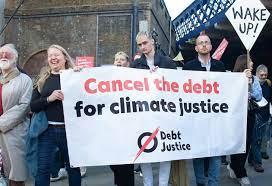
https://debtjustice.org.uk/campaigns/no-more-climate-debt
The situation
Lower income countries are least responsible for emissions causing the climate crisis, and worst affected. It’s the richer polluting countries that should pay for the damage caused and to support the transition, something they have partly acknowledged but have so far failed to do.
Several countries in the Caribbean were devastated by hurricanes during 2017. Some of those countries were already heavily indebted, partly because of loans taken out to help with rebuilding efforts following previous disasters. In the event of environmental disaster, we call on all creditors, including the IMF and World Bank, to suspend debt payments. Debts must be reduced to a sustainable level, and assistance to rebuild must be provided as grants, not loans.
ABOUT
We are a campaigning organisation that exists to end unjust debt and its root causes, formerly named Jubilee Debt Campaign. Through campaigning, community organising, research and activism, we build collective power with the people most affected by personal debt in the UK and public debt in exploited countries. So together we can rewrite the rules of global finance and build a fair economy for all.
We are a people powered organisation and part of global movement for change. Get involved in our campaigns today.
Our story
On the 16th May 1998, 70,000 people took to the streets of Birmingham and formed a ‘human chain’ around the city which was then hosting a global summit with world leaders. Thousands of ordinary people filled the city centre calling for debt cancellation for lower income countries. This was a defining moment in our campaign for debt justice.
Standing on the shoulders of decades of debt justice activism in the global south, the late 1990s saw the issue of debt injustice – particularly that owed from the global south to the global north – become one of the most significant political issues of the era because of the Jubilee 2000 movement. Between 2000-2015 the global Jubilee campaign won $130 billion of debt cancellation for developing countries.
However, the scheme did not prevent debt crises recurring. The same structural causes that led to the crisis remain in place. The 2010’s also saw the debt crisis come to Europe in the wake of the financial crisis as the Greek government was forced to cut spending because of their debts, and debt began building again in lower income countries. Exacerbated by the global pandemic in recent years, 54 countries are now in debt crisis. In 2020 we launched a new campaign for debt cancellation, and have already won significant changes. Including the launch of a new international process for debt cancellation.
Here in the UK personal debt has reached new highs. Over half of UK adults are now in debt or worried about falling into debt. As an organisation that aims to stop debt from causing and exacerbating poverty, we began work on tackling the unjust build-up for personal debt here in the UK.
We continue to campaign for debt justice, working alongside our allies in lower income countries facing debt crises, such as Mozambique and Zambia, as well as working on the issue of personal debt here in the UK.









